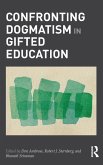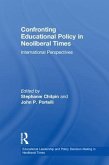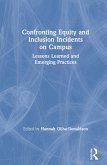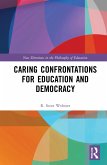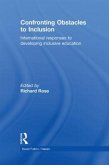Confronting Challenges in English Language Teacher Education
Global Innovations and Opportunities
Herausgeber: Troudi, Salah; Mazandarani, Omid
Confronting Challenges in English Language Teacher Education
Global Innovations and Opportunities
Herausgeber: Troudi, Salah; Mazandarani, Omid
- Gebundenes Buch
- Merkliste
- Auf die Merkliste
- Bewerten Bewerten
- Teilen
- Produkt teilen
- Produkterinnerung
- Produkterinnerung
This edited volume presents an inter- and multidisciplinary approach towards language teacher education, confronting the issues that have continued to pervade the field for last two decades.
Andere Kunden interessierten sich auch für
![Confronting Dogmatism in Gifted Education Confronting Dogmatism in Gifted Education]() Confronting Dogmatism in Gifted Education206,99 €
Confronting Dogmatism in Gifted Education206,99 €![Confronting Marginalisation in Education Confronting Marginalisation in Education]() Kyriaki MessiouConfronting Marginalisation in Education206,99 €
Kyriaki MessiouConfronting Marginalisation in Education206,99 €![Confronting Educational Policy in Neoliberal Times Confronting Educational Policy in Neoliberal Times]() Confronting Educational Policy in Neoliberal Times195,99 €
Confronting Educational Policy in Neoliberal Times195,99 €![Confronting Equity and Inclusion Incidents on Campus Confronting Equity and Inclusion Incidents on Campus]() Confronting Equity and Inclusion Incidents on Campus196,99 €
Confronting Equity and Inclusion Incidents on Campus196,99 €![Caring Confrontations for Education and Democracy Caring Confrontations for Education and Democracy]() R. Scott WebsterCaring Confrontations for Education and Democracy195,99 €
R. Scott WebsterCaring Confrontations for Education and Democracy195,99 €![Confronting Obstacles to Inclusion Confronting Obstacles to Inclusion]() Confronting Obstacles to Inclusion228,99 €
Confronting Obstacles to Inclusion228,99 €![English Language Teacher Education in Chile English Language Teacher Education in Chile]() Malba BarahonaEnglish Language Teacher Education in Chile227,99 €
Malba BarahonaEnglish Language Teacher Education in Chile227,99 €-
-
-
This edited volume presents an inter- and multidisciplinary approach towards language teacher education, confronting the issues that have continued to pervade the field for last two decades.
Hinweis: Dieser Artikel kann nur an eine deutsche Lieferadresse ausgeliefert werden.
Hinweis: Dieser Artikel kann nur an eine deutsche Lieferadresse ausgeliefert werden.
Produktdetails
- Produktdetails
- Verlag: Routledge
- Seitenzahl: 308
- Erscheinungstermin: 4. September 2024
- Englisch
- Abmessung: 240mm x 161mm x 21mm
- Gewicht: 628g
- ISBN-13: 9781032623245
- ISBN-10: 1032623241
- Artikelnr.: 70149029
- Herstellerkennzeichnung
- Libri GmbH
- Europaallee 1
- 36244 Bad Hersfeld
- gpsr@libri.de
- Verlag: Routledge
- Seitenzahl: 308
- Erscheinungstermin: 4. September 2024
- Englisch
- Abmessung: 240mm x 161mm x 21mm
- Gewicht: 628g
- ISBN-13: 9781032623245
- ISBN-10: 1032623241
- Artikelnr.: 70149029
- Herstellerkennzeichnung
- Libri GmbH
- Europaallee 1
- 36244 Bad Hersfeld
- gpsr@libri.de
Salah Troudi is Professor in TESOL and Language Education at the University of Exeter, UK. Omid Mazandarani is Assistant Professor in TESOL and Language Education at Islamic Azad University, Iran.
Chapter 1 Current Issues in Language Teacher Education: An Introduction
Part I Issues of Professional Development
Chapter 2 The Need to Warrant Attention to Chilean English Language Teacher
Educators' Professional Development and Learning
Chapter 3 Between Theory and Practice: The Challenges and the Professional
Development Needs of In-service English Language Teachers in Palestine
Chapter 4 Towards a Reflective Practice in Adult English Teaching as a
Foreign Language in Mexico
Chapter 5 Language Teacher Innovation in Times of Change: A Roadmap for the
Future in UAE Higher Education
Part II Critical Approaches to Language Teacher Education
Chapter 6 Advancing Gender Equity in University Level Foreign Language
Learning in the US: The Role of the Instructor
Chapter 7 The Other Language Policy in Limbo and Being the Other Language
Teacher in the Post-Conflict School Environment in Divided Cyprus
Chapter 8 Raising In-service Teachers' Ethical Awareness Through Action
Research Interventions at Kuwait Public Primary Schools
Chapter 9 A Reflexive Practice Model for Continuous Critical Professional
Development in Lebanon
Part III Pedagogical Issues in Language Teacher Education
Chapter 10 Exploring EFL Tunisian Teachers' Beliefs about Written
Corrective Feedback (WCF) to Inform Teachers' Education Programs
Chapter 11 Critical Pedagogy in Saudi EFL Writing Classrooms: From
Dreariness to Independence
Chapter 12 Differences in Emotional Vocabulary Due to the Level of
Proficiency and the Age of Acquisition of the Foreign Language in Spanish
Students
Chapter 13 Critical Thinking in Academic Writing: Perspectives of Pakistani
University Teachers and Students
Part IV Online issues in Language Teacher Education
Chapter 14 The Significance of Online Training Courses on the Professional
Development of Teachers: A Critical Study in the UAE
Chapter 15 English Language Teacher Identity in Online Teaching in Saudi
Arabia
Chapter 16 Supporting EFL Teachers' Transition to Synchronous Online
Teaching: The Roles of Data Literacy
Chapter 17 An Abrupt Paradigm Shift in Higher Education in Tunisia due to
COVID 19
Chapter 18 COVID-19 and Language Teacher Education in Oman: Practices,
Challenges, and Opportunities
Epilogue
Chapter 19 Language Teacher Education: A Way Forward
Part I Issues of Professional Development
Chapter 2 The Need to Warrant Attention to Chilean English Language Teacher
Educators' Professional Development and Learning
Chapter 3 Between Theory and Practice: The Challenges and the Professional
Development Needs of In-service English Language Teachers in Palestine
Chapter 4 Towards a Reflective Practice in Adult English Teaching as a
Foreign Language in Mexico
Chapter 5 Language Teacher Innovation in Times of Change: A Roadmap for the
Future in UAE Higher Education
Part II Critical Approaches to Language Teacher Education
Chapter 6 Advancing Gender Equity in University Level Foreign Language
Learning in the US: The Role of the Instructor
Chapter 7 The Other Language Policy in Limbo and Being the Other Language
Teacher in the Post-Conflict School Environment in Divided Cyprus
Chapter 8 Raising In-service Teachers' Ethical Awareness Through Action
Research Interventions at Kuwait Public Primary Schools
Chapter 9 A Reflexive Practice Model for Continuous Critical Professional
Development in Lebanon
Part III Pedagogical Issues in Language Teacher Education
Chapter 10 Exploring EFL Tunisian Teachers' Beliefs about Written
Corrective Feedback (WCF) to Inform Teachers' Education Programs
Chapter 11 Critical Pedagogy in Saudi EFL Writing Classrooms: From
Dreariness to Independence
Chapter 12 Differences in Emotional Vocabulary Due to the Level of
Proficiency and the Age of Acquisition of the Foreign Language in Spanish
Students
Chapter 13 Critical Thinking in Academic Writing: Perspectives of Pakistani
University Teachers and Students
Part IV Online issues in Language Teacher Education
Chapter 14 The Significance of Online Training Courses on the Professional
Development of Teachers: A Critical Study in the UAE
Chapter 15 English Language Teacher Identity in Online Teaching in Saudi
Arabia
Chapter 16 Supporting EFL Teachers' Transition to Synchronous Online
Teaching: The Roles of Data Literacy
Chapter 17 An Abrupt Paradigm Shift in Higher Education in Tunisia due to
COVID 19
Chapter 18 COVID-19 and Language Teacher Education in Oman: Practices,
Challenges, and Opportunities
Epilogue
Chapter 19 Language Teacher Education: A Way Forward
Chapter 1 Current Issues in Language Teacher Education: An Introduction
Part I Issues of Professional Development
Chapter 2 The Need to Warrant Attention to Chilean English Language Teacher
Educators' Professional Development and Learning
Chapter 3 Between Theory and Practice: The Challenges and the Professional
Development Needs of In-service English Language Teachers in Palestine
Chapter 4 Towards a Reflective Practice in Adult English Teaching as a
Foreign Language in Mexico
Chapter 5 Language Teacher Innovation in Times of Change: A Roadmap for the
Future in UAE Higher Education
Part II Critical Approaches to Language Teacher Education
Chapter 6 Advancing Gender Equity in University Level Foreign Language
Learning in the US: The Role of the Instructor
Chapter 7 The Other Language Policy in Limbo and Being the Other Language
Teacher in the Post-Conflict School Environment in Divided Cyprus
Chapter 8 Raising In-service Teachers' Ethical Awareness Through Action
Research Interventions at Kuwait Public Primary Schools
Chapter 9 A Reflexive Practice Model for Continuous Critical Professional
Development in Lebanon
Part III Pedagogical Issues in Language Teacher Education
Chapter 10 Exploring EFL Tunisian Teachers' Beliefs about Written
Corrective Feedback (WCF) to Inform Teachers' Education Programs
Chapter 11 Critical Pedagogy in Saudi EFL Writing Classrooms: From
Dreariness to Independence
Chapter 12 Differences in Emotional Vocabulary Due to the Level of
Proficiency and the Age of Acquisition of the Foreign Language in Spanish
Students
Chapter 13 Critical Thinking in Academic Writing: Perspectives of Pakistani
University Teachers and Students
Part IV Online issues in Language Teacher Education
Chapter 14 The Significance of Online Training Courses on the Professional
Development of Teachers: A Critical Study in the UAE
Chapter 15 English Language Teacher Identity in Online Teaching in Saudi
Arabia
Chapter 16 Supporting EFL Teachers' Transition to Synchronous Online
Teaching: The Roles of Data Literacy
Chapter 17 An Abrupt Paradigm Shift in Higher Education in Tunisia due to
COVID 19
Chapter 18 COVID-19 and Language Teacher Education in Oman: Practices,
Challenges, and Opportunities
Epilogue
Chapter 19 Language Teacher Education: A Way Forward
Part I Issues of Professional Development
Chapter 2 The Need to Warrant Attention to Chilean English Language Teacher
Educators' Professional Development and Learning
Chapter 3 Between Theory and Practice: The Challenges and the Professional
Development Needs of In-service English Language Teachers in Palestine
Chapter 4 Towards a Reflective Practice in Adult English Teaching as a
Foreign Language in Mexico
Chapter 5 Language Teacher Innovation in Times of Change: A Roadmap for the
Future in UAE Higher Education
Part II Critical Approaches to Language Teacher Education
Chapter 6 Advancing Gender Equity in University Level Foreign Language
Learning in the US: The Role of the Instructor
Chapter 7 The Other Language Policy in Limbo and Being the Other Language
Teacher in the Post-Conflict School Environment in Divided Cyprus
Chapter 8 Raising In-service Teachers' Ethical Awareness Through Action
Research Interventions at Kuwait Public Primary Schools
Chapter 9 A Reflexive Practice Model for Continuous Critical Professional
Development in Lebanon
Part III Pedagogical Issues in Language Teacher Education
Chapter 10 Exploring EFL Tunisian Teachers' Beliefs about Written
Corrective Feedback (WCF) to Inform Teachers' Education Programs
Chapter 11 Critical Pedagogy in Saudi EFL Writing Classrooms: From
Dreariness to Independence
Chapter 12 Differences in Emotional Vocabulary Due to the Level of
Proficiency and the Age of Acquisition of the Foreign Language in Spanish
Students
Chapter 13 Critical Thinking in Academic Writing: Perspectives of Pakistani
University Teachers and Students
Part IV Online issues in Language Teacher Education
Chapter 14 The Significance of Online Training Courses on the Professional
Development of Teachers: A Critical Study in the UAE
Chapter 15 English Language Teacher Identity in Online Teaching in Saudi
Arabia
Chapter 16 Supporting EFL Teachers' Transition to Synchronous Online
Teaching: The Roles of Data Literacy
Chapter 17 An Abrupt Paradigm Shift in Higher Education in Tunisia due to
COVID 19
Chapter 18 COVID-19 and Language Teacher Education in Oman: Practices,
Challenges, and Opportunities
Epilogue
Chapter 19 Language Teacher Education: A Way Forward


